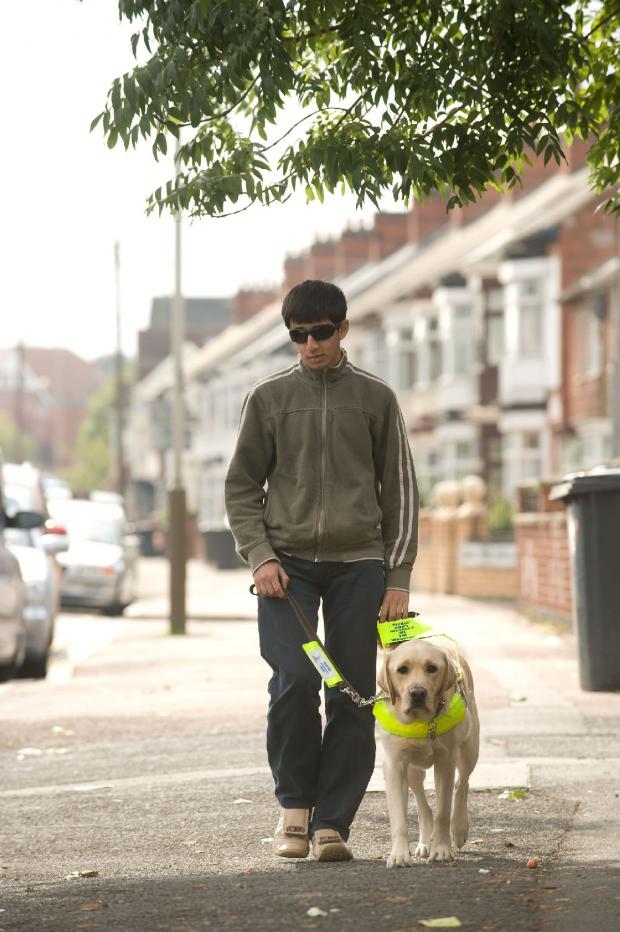When the ‘blind’ guide the blind
Voice of the Valley by Pearl Lee, as published in Malay Mail today.
FEAR, uncertainty and doubt have left the future of guide dogs for the blind in this country in uncertainty.
From fear of being attacked by a dog, who will pick up the dog’s droppings in a bus, to Islam prohibiting believers not to keep dogs are some of the issues hindering the services of our four-legged friends trained to lead the visually impaired.
The article ‘Man’s best friend not loved by everyone’ in Malay Mail
recently was a test the public’s response towards Stevens Chan, a blind
man and his guide dog Lashawn.
Stevens and his guide dog were unwelcomed in a shopping mall and found it difficult to hail a taxi or even a bus.
The simple study showed how unfriendly our ecosystem is when it
comes to guide dogs and dogs in general. It also revealed many do not
know the difference between a guide dog and a pet.
The
article, which went viral online with more than 34,000 “shares” and
43,000 “likes” on Facebook at press time, sparked a debate on whether
the authorities would allow guide dogs to assist their blind owners at
public places.
It is natural some may feel uneasy sitting next to an animal in a
bus. But it was refreshing to hear that Land Public Transport Commission
(SPAD) chairman Tan Sri Syed Hamid Albar had no qualms with guide dogs
being allowed on public transport.
Guide dogs, he said, were a necessity for the blind and added it was just a matter of getting the public used to it.
Perlis mufti Dr Juada Jaya, had last year, said there was no issue even for Muslims to engage the services of guide dogs.
“Using the services of trained guide dogs were allowed in the
religion, including the Syafie mazhab, which is subscribed by Muslims in
the country,” he was quoted as saying in an English daily.
Juanda
went on to say blind Muslims in the country do not consider having
guide dogs as there was confusion on the exact ruling and status of dogs
in Islam.
The report went on to quote Fatwa Council president Tan Sri Dr
Abdul Shukor Husni who said no specific fatwa had been issued on guide
dogs for the blind.
He said no request had been made by the
blind to consider a fatwa on guide dogs and he called for Muslims
concerned about the issue to come forward to discuss the matter.
The UK’s Muslim Law Council, had in 2008, issued a fatwa that a
blind person, in light of syariah law, would be allowed to keep a guide
dog to help him and if required to take him to the mosque for prayers.
The passing of the fatwa allowed a blind teenager Mohammed Abraar
Khatri (pic), then 18, to bring his guide dog Vargo to a mosque in Leicester,
allowing Abraar to perform his prayers. A special cage was dedicated to
Vargo inside the mosque’s compound.
Many of us fear walking alone in quiet alleys where we fear being attacked by snatch thieves.
Now
imagine what a visually impaired person feels. Walking alone just with a
walking stick. From the fear of being mugged, to the possibility of
being hit by a vehicle, our visually challenged friends are more prone
to danger compared to the rest of us.
We must understand a guide dog should not be touched or fed when it is on duty.
Guide dogs also undergo a through two-year training programme before they can be matched to their owners.
Sadly many, including the authorities, are still in the dark over the role played by our special canine friends.
Deputy Transport Minister Datuk Abdul Aziz Kaprawi is one of them
as he had reportedly said guide dogs could cause inconvenience to the
blind.
“What if the dog pees in a bus or in the train? Who
will clean up the mess? I fear the other commuters might get angry with
the disabled owner,” he was quoted as saying.
Abdul Aziz must know that guide dogs like Lashawn are trained to
“do their business” upon the owner’s instruction. The dogs will only
poop twice a day — that too when commanded by the owner and the dog
would only do so at a grassy area.
Society must not confuse guide dogs with dogs owned by ignorant
owners who allow their pets to run wild and create a huge mess. Dog
owners too should not be generalised based on the tidak apa attitude of
other owners.
The blind community needs assistance —from what they can and should do — to help them lead a better life.
It is high time for the authorities to “guide” them.



Comments
Post a Comment